Yesterday morning I ran a mile in eight minutes. Each lap of the quarter mile track required almost exactly two minutes of exertion. At the end of the eight-minute workout, I was pretty much pooped and headed over to the deli with my running buddies for some companionship, conversation, and comestibles. One mile in eight minutes was as fast and as far as I was able to run.
A couple decades ago, I would run 20 miles, each of which took eight minutes. The workout took something under three hours after which I was similarly exhausted. My cadre of sweaty friends and I would pop over to the breakfast place to chat and eat. Twenty miles at eight minutes each was as far and as fast as I was able to run.
There are two ways to look at the fact that at 65 I can run 19 fewer miles at the same pace than I could at 45. I could be peeved. I could just say the heck with the whole miserable business. I could enumerate the “nevers.” I will never run another 5-kilometer race in under 20 minutes (or under 25 minutes for that matter.) I will never run another marathon. I will never be able to head out with my running buddies without a map or GPS or any clear idea of where we are going because we were sufficiently conditioned to run back from anywhere no matter how lost or how far we went. I will never again believe that “pain is fatigue leaving the body” because half-way between 60 and 70 years of age, discomfort is our constant companion beginning not at mile 15 or 16 but at step 15 or 16.
Or instead of the nevers, I could catalog the affirmations: I can still run; I can still enjoy a companionable chat with my running buddies of 40 years. I can count on my heart, lungs, and legs to take me four times around the track.
“There is nothing either good or bad but thinking makes it so” remarked the melancholy Dane although—no matter how many times I read Hamlet, I can’t find even one reference to track workouts. But the “nevers” and the affirmations are still referencing the same distances and the same pace. What matters is my perception of how far I run and how fast. My sense of myself and my ability is independent of the clock or the odometer.
This isn’t about everyone getting a trophy. It’s about how I feel. Believe me, no one is giving trophies to a 65-year-old running a mile in eight minutes.
Your kids will bring you a certain quantity of joy and sorrow. You can choose to focus on their accomplishments—admissions to graduate school, marrying someone from a “good” family—or you can zero in on what you perceive as failures—a C on an algebra test, an imperfect career choice. But an entirely different metric is more likely to bring you contentment. Why not emphasize the unabashed joy of having a healthy child? Why not be elated that your kid isn’t in the ICU recovery from a bone marrow transplant? Why not just accept the kid you’ve got?
This essay may be read as simplistic—enjoy the kid you have and you’ll have the kid you enjoy—or even tautological: if you like your kid, you’ll like your kid. But I think it’s deeper than that. Modeling contentment is the best way to allow your kids to be satisfied with who they are. “If you yell at your kid, they don’t stop loving you. They stop loving themselves.” Similarly, if you enjoy being with your kids, they are more likely to appreciate being in their own skin.
Something to be said for that—whether they get an A in algebra or a C, whether they go to graduate school, whether they earn a little money or a lot, whether they can run one mile or twenty.





One thought on “The Eight-Minute Mile”
I so enjoyed reading this….a great perspective both for parents – and for 65 year old runners and their friends!